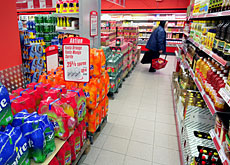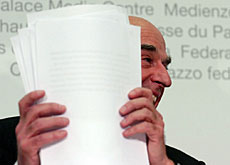Debate over VAT reform heats up

Opinions are divided over a proposed overhaul of Switzerland's complex value added tax (VAT) system as a consultation period nears an end.
The Swiss Business Federation (economiesuisse) championed a flat rate of six per cent with no exemptions on Wednesday. But opponents believe this will hit households hard, particularly if health care attracts the levy.
In February Finance Minister Hans-Rudolf Merz listed 50 measures to simplify the VAT system and make it more transparent. His preferred option is to introduce a single rate with exceptions made for rental properties, property transactions, banks, life insurance and agriculture.
The current set-up has a main rate of 7.6 per cent, a reduced rate of 2.4 per cent for essential consumer goods and 3.6 per cent added to hotel bills. The 25 exemptions include health care, education, research, culture and sports clubs.
Economiesuisse calculates that the introduction of a single rate will save businesses SFr1.5 billion ($1.25 billion) a year in administrative costs and boost gross domestic produce by 0.8 per cent in the long term by stimulating competition.
The Federation also argues that services currently exempt from VAT, including health care, will also benefit by shaking off a so-called “shadow tax”. This is incurred when such sectors are unable to claim back VAT from services, such as IT outsourcing, that they rely on to operate.
Federation tax specialist Frank Marty brushed off complaints that taxing health care would add to household bills. He calculates an average increase of SFr40 a year that would soon be absorbed by the long-term growth to the economy.
Rocketing bills
“The health industry is growing and is consumed like any other sector. What theoretical reason can there be to not tax health services?” Marty told swissinfo.
“About 77 per cent of services and goods sold will profit from the lower tax rate [six per cent, down from 7.6 per cent],” he added.
However, the Swiss Association of Health Insurers, Santésuisse, says taxing healthcare will result in rocketing medical bills.
“This would result in a SFr1 billion increase in premiums, a rise of five per cent, just to compensate for the effects of the new tax,” spokesman Peter Marbet told swissinfo.
“Unsurprisingly, we feel we should continue with the VAT exemption for the healthcare sector.”
One option put forward by Merz earlier this year is an increased flat rate of 6.4 per cent with healthcare exempted from the tax.
Inequalities feared
Other voices to have spoken out against the proposed reforms are consumer protection organisations that fear a general rise in prices.
The hotel industry and sport clubs are also opposed to the plans, but the construction sector said on Wednesday that a single rate would boost competition between themselves and the agricultural and horticultural sectors that currently pay less or no VAT.
The centre-right Radical party are the only party in government to support Merz’s proposals that the centre-right Christian Democrats and rightwing Swiss People’s Party have rejected.
The centre-left Social Democrats believe a rise in food prices and health costs will hit low and middle-income families the worst.
The consultation period ends on July 31 after which a draft law will be presented to parliament.
swissinfo, Matthew Allen with agencies
Two countries in the European Union – Denmark and Slovakia – have already introduced a single VAT but at much higher rates: 25 and 19 per cent respectively.
VAT rates across the EU range from 15 per cent in Cyprus and Luxembourg to 25 per cent in Sweden and Denmark.
But most EU states have reduced rates for certain goods such as books, newspapers, medication and food. Hotels are also given a preferred rate in Austria, France and Italy.
Value added tax was introduced in 1995 to replace a turnover tax on goods.
The main rate is 7.6%.
Essential consumer goods such as food, non-alcoholic drinks, medication, and books and newspapers are taxed at 2.4%.
Hotels are required to add only 3.6% to their guests’ hotel bill.
Banks, insurance, hospitals and agriculture are among the 25 sectors exempt.
VAT generated revenues of SFr19 billion in 2006.

In compliance with the JTI standards
More: SWI swissinfo.ch certified by the Journalism Trust Initiative












You can find an overview of ongoing debates with our journalists here . Please join us!
If you want to start a conversation about a topic raised in this article or want to report factual errors, email us at english@swissinfo.ch.